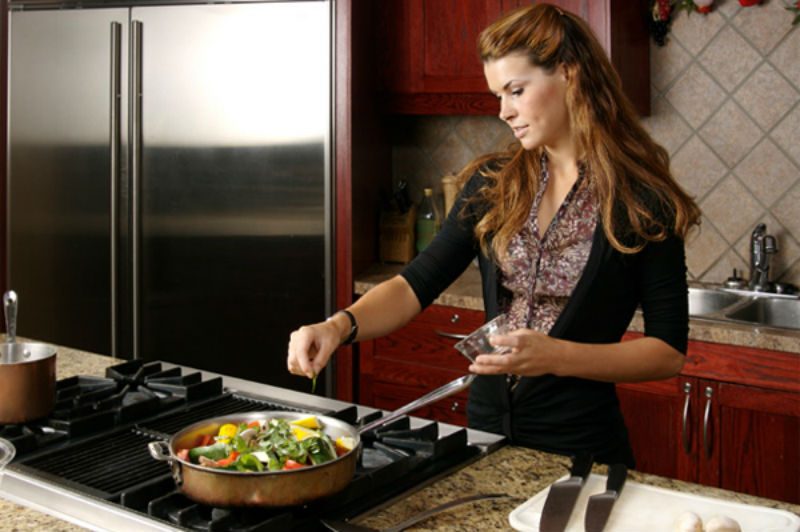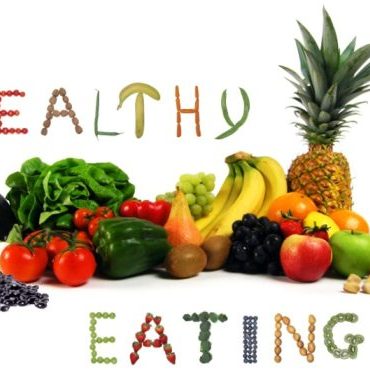 Arlene gives us advice on the varying nutritional value of foods, and what we can do to maintain a healthy weight.
Arlene gives us advice on the varying nutritional value of foods, and what we can do to maintain a healthy weight.
How much does cooking damage the quality of most foods?
The nutrient value of food is almost always altered by the kind of processing it undergoes. The water-soluble vitamins are the most vulnerable to processing and cooking. Careful cooking and storage will help retain the nutrients in your food.
Almost all food is processed in some way before it is eaten. Commercially, the main reasons to process food are to eliminate micro-organisms (which may cause disease) and to extend shelf life.
Simply cooking or combining food with other foodstuffs to create a recipe is also considered a form of food processing. Whatever the case, the nutrient value of any food is often altered by the processing.
Some vitamins are more stable (less affected by processing) than others. Water-soluble vitamins (B-group and C) are more unstable than fat-soluble vitamins (K, A, D and E) during food processing and storage.
The most unstable vitamins include:
- folate
- thiamine
- vitamin C.
More stable vitamins include:
- niacin (vitamin B3)
- vitamin K
- vitamin D
- biotin (vitamin B7)
- pantothenic acid (vitamin B5).
Most vegetables are peeled or trimmed before cooking to remove the tough skin or outer leaves. But most nutrients, such as vitamins, tend to lie close to the skin surface, so excessive trimming can mean a huge reduction in a vegetable’s nutrient value.
Some vitamins dissolve in water, so you lose your vitamins to the cooking water if you prefer to boil your vegetables. For example, boiling a potato can cause much of the potato’s B and C vitamins to migrate into the boiling water.
It is still possible to benefit from these nutrients if you consume the liquid, for example, by turning the potato and the liquid into a soup. Alternative cooking methods such as grilling, roasting, steaming, stir-frying or microwaving generally preserve a greater amount of vitamins and other nutrients.
It would be inaccurate to say that cooking food always lessens the nutrient value. Cooking can be advantageous in many ways, including:
- making the food tastier
- breaking down parts of vegetables that would otherwise be indigestible
- destroying bacteria or other harmful micro-organisms
- making phytochemicals more available, for instance, phytochemicals are more available in cooked tomatoes than in raw tomatoes. (Phytochemicals are chemicals produced by plants.)
 What can one do to combat menopause weight gain?
What can one do to combat menopause weight gain?
Most women gain weight as they age, but excess kilos aren’t inevitable. To minimise menopause weight gain, step up your activity level and enjoy a healthy diet.
When you hit menopause, your metabolism slows down. I have been through this myself, so know how frustrated you feel. Your exercise is really great, so please continue to do this. However, you do need to reduce your calorie intake. You should be eating 6 small meals a day. Keep your portions small. The hormonal changes that menopause brings are an important factor in weight gain and make losing weight more difficult. In addition, these hormonal changes make gaining muscle difficult and you also have to be careful of bone loss.
As we start the change, the production of our body’s two major hormones, oestrogen and progesterone, starts to fall. This in itself is entirely natural.
The hormonal changes of menopause might make you more likely to gain weight around your abdomen than around your hips and thighs. Hormonal changes alone don’t necessarily trigger menopause weight gain, however. Instead, the weight gain is usually related to aging, as well as lifestyle and genetic factors.
For example, muscle mass typically diminishes with age, while fat increases. Loss of muscle mass decreases the rate at which your body uses calories, which can make it more challenging to maintain a healthy weight. If you continue to eat as you always have and don’t increase your physical activity, you’re likely to gain weight.
Genetic factors also might play a role in menopause weight gain. If your parents or other close relatives carry extra weight around the abdomen, you’re likely to do the same.
Sometimes factors such as the stress of children leaving home — or returning — divorce, the death of a spouse, or other life changes might change your diet or exercise habits and contribute to menopause weight gain. Increased amounts of the stress hormone Cortisol can cause fat deposition.
There’s no magic formula for preventing or reversing menopause weight gain. Simply stick to weight-control basics:
- Move more. Aerobic activity can help you shed excess pounds and maintain a healthy weight. Strength training counts, too. As you gain muscle, your body burns calories more efficiently, which makes it easier to control your weight. Do recommended aerobic activity, such as brisk walking, for at least 60 minutes each day. In addition, strength training exercises are recommended at least twice a week. If you want to lose weight or meet specific fitness goals, you might need to exercise more.
- Eat less. To maintain your current weight — let alone lose excess kilos— you might need about 300 fewer calories a day during your 50s than you did during your 30s and 40s. To reduce calories without skimping on nutrition, pay attention to what you’re eating and drinking. Choose more fruits, vegetables and whole grains. Opt for lean sources of protein.
- Seek support. Surround yourself with friends and loved ones who’ll support your efforts to eat a healthy diet and increase your physical activity. Better yet, team up and make the lifestyle changes together. Consult an accredited practising dietitian to review your food intake.
Remember, successful weight loss at any stage of life requires permanent changes in diet and exercise habits. Take a brisk walk every day. Try a yoga class. Swap cookies for fresh fruit. Split restaurant meals with a friend. Commit to the changes and enjoy a healthier you!
 Will exercise help me lose weight?
Will exercise help me lose weight?
Exercising to lose weight is not a waste of time, but the real only way to shed those unwanted kilos is to eat less. Exercise does help you increase your lean body tissue (muscle) which helps increase your metabolic rate. It is also very good for your mood and is a stress release that motivates you to make better choices of food.
There are different types of exercise, and while physical activity is undoubtedly necessary for cardiovascular fitness, muscle strength, metabolism, core stability, posture and body shape, it is not the answer for losing weight on its own. When exercise is combined with a cut in kilojoule intake, the weight loss can be as high as 7.5 kilograms in just 12 weeks. While diet is more effective for short-term weight loss, evidence suggests a continuing exercise program outweighs the value of diet in the maintenance of weight loss over two or more years. In a second or two we can easily eat hundreds of kilojoules – which overweight people do – and it would take hours to exercise those off. The right food choices can reduce our kilojoule intake by thousands every day. It would take over five or six hours of exercise to get the same benefit.
Each person has their own unique kilojoule reference point, which is the most kilojoules they can eat in a day and still lose weight without the need for any extra physical activity. People who exercise to lose weight also tend to pay less attention to their diet, which makes it even more difficult for them to lose weight. Exercise for weight loss is a serious long-term health risk because of the added load on the body’s organs. We have to change our food choices to lose weight and be aware of our portion sizes.
What factors contribute to obesity?
Obesity is a complex condition with biological, genetic, behavioural, social, cultural, and environmental influences.
Obesity usually results from a combination of causes and contributing factors, including:
- Genetics. Your genes may affect the amount of body fat you store, and where that fat is distributed. Genetics may also play a role in how efficiently your body converts food into energy and how your body burns calories during exercise.
- Family lifestyle. Obesity tends to run in families. If one or both of your parents are obese, your risk of being obese is increased. That’s not just because of genetics. Family members tend to share similar eating and activity habits.
- Inactivity. If you’re not very active, you don’t burn as many calories. With a sedentary lifestyle, you can easily take in more calories every day than you burn through exercise and routine daily activities. Having medical problems, such as arthritis, can lead to decreased activity, which contributes to weight gain.
- Unhealthy diet. A diet that’s high in calories, lacking in fruits and vegetables, full of fast food and laden with high-calorie beverages and oversized portions contributes to weight gain.
- Medical problems. In some people, obesity can be traced to a medical cause, such as Prader-Willi syndrome, Cushing’s syndrome and other conditions. Medical problems, such as arthritis, also can lead to decreased activity, which may result in weight gain.
- Certain medications. Some medications can lead to weight gain if you don’t compensate through diet or activity. These medications include some antidepressants, anti-seizure medications, diabetes medications, antipsychotic medications, steroids and beta-blockers.
- Social and economic issues. Research has linked social and economic factors to obesity. Avoiding obesity is difficult if you don’t have safe areas to exercise. Similarly, you may not have been taught healthy ways of cooking, or you may not have money to buy healthier foods. In addition, the people you spend time with may influence your weight — you’re more likely to become obese if you have obese friends or relatives.
- Age. Obesity can occur at any age, even in young children. But as you age, hormonal changes and a less active lifestyle increase your risk of obesity. In addition, the amount of muscle in your body tends to decrease with age. This lower muscle mass leads to a decrease in metabolism. These changes also reduce calorie needs and can make it harder to keep off excess weight. If you don’t consciously control what you eat and become more physically active as you age, you’ll likely gain weight.
- Pregnancy. During pregnancy, a woman’s weight necessarily increases. Some women find this weight difficult to lose after the baby is born. This weight gain may contribute to the development of obesity in women.
- Lack of sleep. Not getting enough sleep or getting too much sleep can cause changes in hormones that increase your appetite. You may also crave foods high in calories and carbohydrates, which can contribute to weight gain.
Even if you have one or more of these risk factors, it doesn’t mean that you’re destined to become obese. You can counteract most risk factors through diet, physical activity and exercise, and behaviour changes.
What is the most successful way to achieve weight loss and management for life?
To lose weight and keep it off, you have to make permanent lifestyle changes to both your eating and exercise habits. To be successful long term in weight loss, you need to consume fewer calories than you burn. It sounds simple, but the difficult component is developing a pattern of eating and exercise you can live with and that will maintain your lighter weight once you have lost those excess kilos. It is important that you realise this will involve changing your lifestyle – both your eating and exercise habits.
The majority of people who manage to maintain their weight loss do not follow extreme diets. They increase their physical activity while reducing their intake of fat and kilojoules – and they make this change for the rest of their lives. The reason so many so-called diets fail is that they put certain foods – and often entire food groups – off-limits. A diet that is too restrictive does not set good eating habits that will last forever. No foods should be avoided completely, provided you watch the size of your portions, especially those items high in kilojoules. For those ones: go easy, don’t go without entirely.
Nutrition needs vary, and so does the kilojoule requirement depending on sex, activity level, health and age. I recommend you consult a professional dietitian to personalise a program for your individual needs.


